| Srl | Item |
| 1 |
ID:
130607
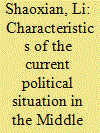

|
|
|
|
|
| Publication |
2014.
|
| Summary/Abstract |
By comparison with the "Arab Spring" that swept through the whole Bregion in 2011 and the political transition evident in many Arab countries in 2012, political development in the Middle East in 2013, to many observers, seemed lost in chaos. Arab countries undergoing political change were plagued by disorder, volatility, and violence. With US. strategic withdrawal from the region imminent, geopolitical dynamics
regrouped. Struggles among regional powers entered a new stage. Four characteristics of the Middle East situation are harbingers for future outcomes: political "ehaos" in the Arab world, "flux and reflux" between moderate and radical lslamists, geopolitical shocks caused by the strategic withdrawal of the U.S. from the region, and continued uncertainty over the Iranian nuclear issue.
|
|
|
|
|
|
|
|
|
|
|
|
|
|
|
|
| 2 |
ID:
133858
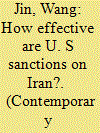

|
|
|
|
|
| Publication |
2014.
|
| Summary/Abstract |
U. S. sanction on Iran have expended since the start of the Iranian nuclear issue. They have grown from small scale embargoes to today's sanctions on multiple sectors including finance, trade, energy and personnel. During U. S. President Barak Obama's tenure, there is very little likelihood that the U. S will resort to force, leaving Washington with no other means than sanctions to persuade Iran to change its nuclear policy. This means that although sanctions have a limited effect, the US will continue primarily rely on them to force Iran's hand.
|
|
|
|
|
|
|
|
|
|
|
|
|
|
|
|
| 3 |
ID:
115893
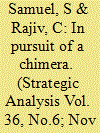

|
|
|
|
|
| Publication |
2012.
|
| Summary/Abstract |
Efforts undertaken to address concerns generated by the Iranian nuclear issue have primarily followed a dual-track approach made up of punitive non-proliferation and economic sanctions at the multi-lateral and unilateral levels and diplomatic-political engagement across the bilateral, tri-lateral and multi-lateral spectrum. These have, however, not been successful in 'forcing' cooperation from Iran on core issues of concern, including in such activities as the stopping of uranium enrichment activities. This is in part due to the mutually reinforcing antagonistic nature of the two-track strategy. While Iranian intransigence has attracted increasingly tough punitive measures, these measures have in turn hardened Iranian positions. They have also been hostage to the nature and content of bilateral relationships that Iran shares with its major interlocutors. While Iran's contentious relationship with the US and the UK and the concomitant trust deficit have bedeviled these efforts, sound strategic/economic reasons underpinning Iran's bilateral ties with Russia and China explain these countries' role as the 'reluctant enforcers'.
|
|
|
|
|
|
|
|
|
|
|
|
|
|
|
|
| 4 |
ID:
111271
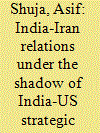

|
|
|
| 5 |
ID:
117791
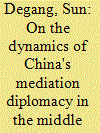

|
|
|
| 6 |
ID:
116392
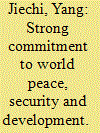

|
|
|
|
|
| Publication |
2012.
|
| Summary/Abstract |
Distinguished Guests,
Ladies and Gentlemen,
Dear Friends,
It gives me great pleasure to attend the World Peace Forum organized by Tsinghua University and co-organized by the Chinese People's Institute of Foreign Affairs and meet with friends old and new. This forum, a joint endeavor by a world famous university and an important organization dedicated to stronger people-to-people exchanges between China and foreign countries, has invited a galaxy of renowned Chinese and foreign experts and scholars to an in-depth discussion on international security issues. This is of great importance to advancing the cause of peace for mankind. In his remarks at the opening session, Vice President Xi Jinping advocated the five principles that we need to follow in promoting global peace and security and expounded on China's policy of committing itself to maintaining world peace and security. His remarks fully demonstrated China's firm resolve to make greater contribution to peace and progress of mankind. Vice President Xi's remarks give important guidance to the Forum. I am sure that the Forum will be a great success.
|
|
|
|
|
|
|
|
|
|
|
|
|
|
|
|